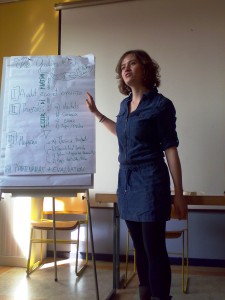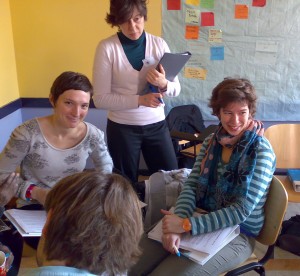Helena Imminga (Berends) developed several interactive methods of teaching on Environment and Development. She used these methods for French and Dutch speaking students in the framework of the Infocycle of the Belgian Technical Cooperation (now Enabel).
1- Proposing sustainable development plans for a developing country
Before meeting for a live course in Brussels, students would have read, among others, a description of the environmental, economic and social situation in Mayotte (a French overseas territory). The 25 students were then asked to choose a smaller group, each group representing a stakeholder in Mayotte: the fishing sector, the tourism sector, government and nature NGOs. The goal was to discuss their ideas and proposals for financing sustainable projects in Mayotte.
These were very lively, creative but concrete discussions. Mayotte was chosen by Helena as she had participated in a European (sustainable) development project dealing with such countries and territories. As Mayotte is not very well known, the students had to think out of the box and develop original ideas and projects, which they did! See the Photos-de-la-preparation-de-projets-pour-Mayotte
2- Simulating an International Negotiation on Climate Change
Another group of 25 participants were involved in an international negotiation on climate change. Students formed smaller groups and could chose among these roles: European Union, China, Peoples Republic of Congo, Maldives, the President of the conference, journalists/ observers. With the written briefs they were given, they prepared their positions/ wishes and negotiaton strategies. Then they discussed and tried to agree on the following questions: Do we want a ceiling for green houses gas emmissions per country? Do we want these ceilings to be voluntary or legally binding? Will we introduce sanctions? How will we fund and help poorer countries?
This exercise showed that one can have very good, fair and legitimate wishes but that listening to others and agreeing together is something else. The students were excellent and enjoyed it. See the pictures: Photos-de-la-negotiation-internationale-sur-le-climat
This climate change negotiation game was developed by Regenboog Advies. Both Helena Berends and Hans van der Heuij had experience with such negotions at the EU and at the UN.


